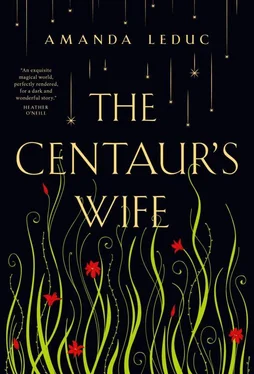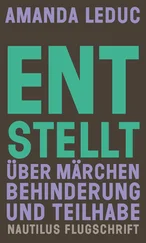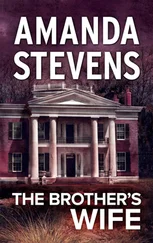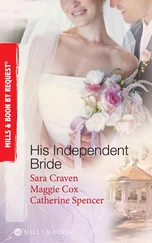“Fine.” Heather gets up, and looks from Moira and the gun to Estajfan and back. She moves to stand in front of him. “I think.”
“Where did you go?” Tasha asks. “When the scream came.”
“I was at the greenhouse. Estajfan took me up the mountain. I was going to come back—I only went there to warn him, to tell him to hide…” She looks up at the house and then back to Tasha. “Did you go inside? Did you see?”
Tasha nods. “I’m so sorry.”
Heather wipes her eyes with her palm. “Were they—did they—”
“The plants came for them,” Annie says, her voice gentle. “The plants came for everyone, in the end.”
Moira is still holding the gun on Estajfan but Tasha can see something more than anger in her face now. Her arms slacken. The barrel dips.
“What are we supposed to do, Tasha?” Heather asks. “Where are we supposed to go?”
“I can answer that,” Joseph says. “We’re going up that fucking mountain!”
“Joseph,” Tasha says, “we can’t go up. It’s too dangerous—”
“I don’t fucking care! You heard Elyse—there’s food up there. We’ve been starving for over a year!”
At last, one of the centaurs speaks. “The mountain isn’t safe for you,” the dark one says. “I do not—” and his eyes shift to Moira, and the gun—“we do not wish you harm.”
“We just want to be left in peace.” This from the blonde female, a bag slung over her shoulder and between her breasts. “That’s all.”
“But Heather went up,” Tasha says.
The female nods and says, “She’s not going up anymore. None of you are.”
“ You don’t fucking get to tell us what to do! ”
Tasha sees Joseph grab Moira’s gun as if in slow motion. The surprise in Moira’s face, the sudden splash of terror on Heather’s. Elyse screams as Joseph shoots, Moira tackles him to the ground, something glinting in her hand.
“Let it go,” Moira says, and as Tasha comes closer, she can see that it’s the scalpel Moira showed her the day before. Moira’s voice is surprisingly calm now. “Let it go, Joseph.”
He stares up at her, anguished. “ Why them? Why do they get to survive? ”
To this, no one has an answer. When Moira finally leans back, Joseph pulls himself up to a sit, small and defeated.
“Moira,” Tasha says. “That scalpel. You said you found it by the water?”
“No. In the forest. After we were—ambushed.”
The female centaur steps over to them. “That’s mine,” she says, urgently. She holds out a hand. “That knife. Heather dropped it in the forest. Give it to me.”
“It’s mine now,” Moira snaps. “Don’t come any closer.”
“Where did you get it?” Tasha looks at the centaur. She can feel Annie watching her, confused.
“My father gave it to me. It was a gift,” the centaur says. “It’s important to me. Please.”
And Tasha drops to her knees after all. “There was a woman in my family,” she says. “Long ago. My mother told me stories. She was a travelling physician.” The centaur knows, Tasha realizes. Maybe she’s always known. She takes a breath and says, “One summer, she delivered triplets in a village.”
THE DOCTOR AND THE VILLAGE GHOSTS
The second time she comes to the mountain, the doctor discovers that the centaur has cleared the path she’d hacked on her first climb. It’s now free of brush, and in places the climb is so gradual it hardly feels like a climb at all. It ends exactly where they met. She finds him waiting for her there. She doesn’t know how he knew she was coming, and doesn’t ask. He is grateful for the textbooks. He doesn’t take her to the children.
The next year is much the same—and the year after that, and the year after that. Every time she asks him if she can meet the children his response is the same: not yet, they aren’t ready. He is grateful and polite but also closed to her. She continues to visit anyway.
Occasionally she travels to the wife’s village. She has five children now, all thriving and happy. The mother is happy too, most of the time. She never mentions her other children now, even when she and the doctor are alone. She is afraid for the safety of her five children in the village; she doesn’t like it when they’re away from her, she doesn’t like it when her husband takes them on trips. But she never goes. Once upon a time she had wanted a different kind of life; now the possibility of a different kind of life for her children terrifies her. The doctor knows that if the mother had her way, her children would never leave her.
The doctor has no children, only secrets.
The doctor brings the centaur medical supplies and history books and maps. She brings novels and books of poetry and mathematics texts that hold delicate equations; she brings dinner plates and wineglasses and cutlery.
She brings the centaur dried herbs and a mortar and pestle and shows him berries on the mountain that will help when his children have a fever; leaves to crush into a salve that will help with cuts and bruises. She brings him a surgeon’s needle and thread and teaches him how to stitch a wound. She points out other plants that he should harvest and dry and use.
“For pain,” she says, “and infection.”
As the years go by, the doctor continues to travel—growing slower as her joints stiffen, but her heart and her mind as strong as ever. Eventually she begins to hear stories of a monster in the old village, and stories of another monster in the city by the mountain. The village and the city are far enough apart that no one would ever note the similarities, but the doctor does. She is tired of people who lie and are afraid.
The village monster, so the story goes, is tall and black as night. It sweeps through the streets in the early-morning darkness, stealing random things. A cooking pot, a toy that lies in a child’s crib. No one can figure it out. What use would a monster—or even a thief—have for such things?
The monster in the mountain city is much the same—stealing furniture, coming and going like a ghost.
The city people tell her that spirits from the mountain come down to strike fear into the hearts of those who want to climb it. Leave the mountain alone, they tell her. As years pass, they tell her this more and more. People have gone up the mountain and disappeared, they say. It’s best to stay away.
And yet despite the stories, the doctor can’t determine if anyone from the city has ever actually gone missing. A friend of a friend of a friend disappears. A girl goes missing, a boy too. Perhaps they ran away together. People tell themselves all kinds of stories when they grieve.
One year she asks the centaur what he knows about the rumours.
“The humans are right to stay away” is all he says.
And yet he loves humans. He can’t get enough of them. Doesn’t he run among them and bring back their treasures? He boasts to her of all the things the children know—he’s taught them their letters, he’s shown them so much. Of the humans far below, he says, “They have only one heart,” as if she doesn’t already know. As if he, too, did not have only one heart himself long ago.
She brings the centaur blankets and jewellery, music boxes and more books. He never even tells her if the children have said thank you. One year a rich patient pays her with a series of handmade golden cuffs; she brings them to the centaur and drops them in a bag at his feet.
The centaur is struck almost speechless by this gift. He picks one up and puts it on his wrist right away.
“You’re supposed to say thank you,” the doctor says. Once more, she wonders if the children are still alive. Maybe there’s no one on the mountain but him and a shrine of human artifacts to his first love.
Читать дальше












